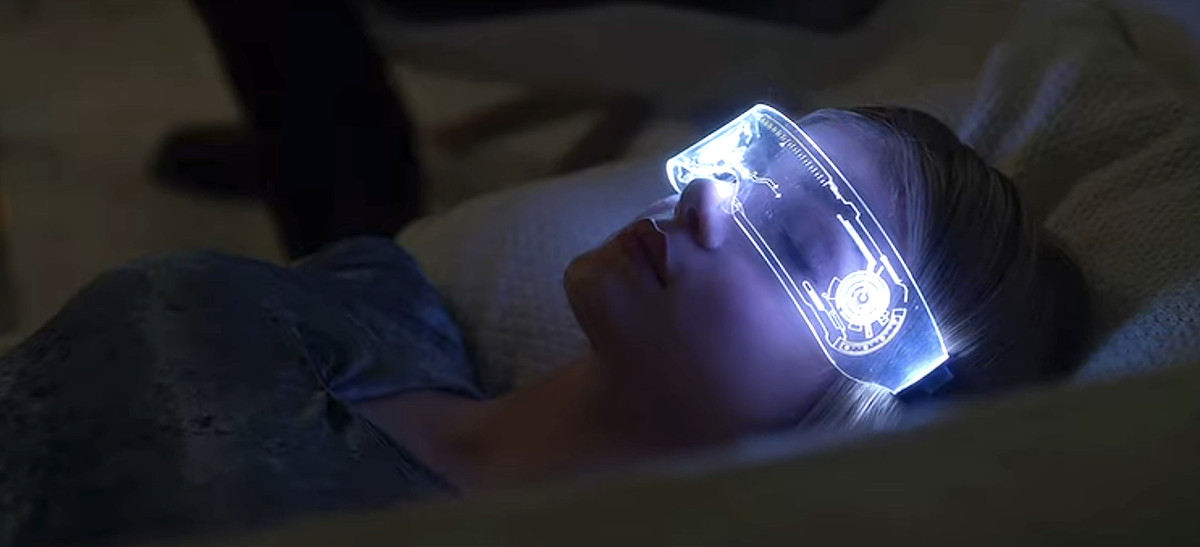Wifelike walks a narrow line around sci-fi sleaze

Stories about robots or clones make for ideal low-budget sci-fi, because they don’t necessarily require elaborate special effects to mount a convincing illusion. Take, for example, Meredith (Elena Kampouris), from the uneven new streaming movie Wifelike. She’s sort of a clone-robot hybrid, an artificial human made by the titular company, which provides “companions” for grieving men (and seemingly only men) who have lost their spouses. These customizable, programmable robots are infused with aspects of a real person, though it’s not immediately clear how much of a woman’s personality can be ported over into an artificial body.
Kampouris plays the “real” Meredith for a few moments throughout the movie; most of the time, though, she’s inhabiting the robo-companion version, with seemingly zero computer enhancements to aid her performance. She only needs oddly rigid posture and body language, augmented by some makeup and overly tidy costuming, to look genuinely uncanny, like an action-figure reproduction of a famous actress.
Image: Paramount Home Entertainment
The look of Meredith, and the other companions shown in Wifelike, is precise. If only the movie made the world around them equally believable. From its movie-opening fake advertisement, the concept of companions is immediately muddled. They’re somehow sold as both fantastically detailed sex dolls and a treatment for crushing grief, purposes that seem at odds with each other. Companions don’t seem sentient enough to inspire the virulent liberation movement seen in the movie.
And in turn, the protestors don’t seem numerous enough to justify a fleet of “agents” like William (Jonathan Rhys Meyers), whose job it is to track down errant sex dolls like a low-rent Blade Runner. As a reward for diligent work, the Wifelike company replaces William’s dead wife with the Meredith bot. But she’s presented more as an employment perk than a grief treatment. Are these robo-wives exploitative sleaziness disguised as therapeutic aids, or vice versa?
In a better movie, the perversity would be the point. Maybe it is in this one, too; it’s hard to tell when William’s obtuse case is the audience’s only consistent window into the practice of doling out companions. Wifelike certainly isn’t shy about sexuality early on, and though the sex scenes between William and Meredith are more softcore silliness than genuine provocation, Meredith does have a funny moment to herself: When exploring the possibility of self-pleasure, she gets an “access denied” message from her central processing system.

Image: Paramount Home Entertainment
That moment is a stand-in for the whole movie, which is most interesting when it leaves Meredith to her own devices. She starts to figure out her own point of view through strange sci-fi touches like her “dream mode,” which allows her to select scenarios for a simulation of human sleep. Meredith also starts out speaking in the third person, only gradually accessing enough sense of self to make first-person statements — a neat idea, though kind of an odd programming wrinkle for such a vastly advanced system.
There’s an amusing moment where Meredith must process a waiver in order to cook William some health-threatening bacon, but sometimes Meredith needs to be taught terms that a computer would probably be able to look up seamlessly. What’s the utility of that slower learning curve, for either a grieving widower or a horny loser? Like the 2004 remake of The Stepford Wives, the movie itself sometimes appears uncertain about the exact hows and whys of the process that makes companions.
As Meredith’s consciousness expands, she’s drawn into the conflict between William’s company and the anti-companion forces, uncovering buried secrets, hidden memories, and so on. This tension would be tighter if Jonathan Rhys Meyers didn’t play William as such a morose creep from the beginning. After 30 minutes or so, Wifelike proceeds with the sinking feeling that writer-director James Bird intends to peel back layers of male decorousness to reveal the entitlement and control underneath. But these qualities are as visible as the skimpy lingerie that the companions all seem to have on hand as accessories.

Image: Paramount Home Entertainment
Rather than developing the uneasy, imbalanced relationship between these two specific characters, Wifelike excavates some barely concealed subtext and proudly lays it out as text: Men subjugate women, and if their attempts to do that are stymied, they’ll invent new women to subjugate some more. There are moments where the movie seems ready to provocatively recast grief and loneliness as catch-all excuses for male misdeeds, but Bird backs away from it by not including any major characters who are genuinely grieving. It’s just another interesting idea the movie raises and drops.
Bird comes up with plenty of details that could fuel either a crazier B-movie or a more reflective sci-fi chamber piece, and Kampouris seems up for either option, whether she’s attempting to assimilate into a cloistered domestic life or making her way through the “dreamscape” that functions as sort of a virtual reality. It’s the low-rent cop-movie-level material with William and his co-worker buddy Jack (Doron Bell) that ultimately pushes Wifelike past the point of no return, into its own uncanny valley. What’s supposed to resemble a smart, unnerving sci-fi movie looks more like a lecture about male dominance and deception that keeps foregrounding its least interesting characters.
Wifelike opens in limited theatrical release on Aug. 12, and is now available to stream on Amazon, Vudu, and other digital rental and purchase platforms.
You can read the full article from the source HERE.
-
Sale!

Aurora: Tender Sex Doll
Original price was: $2,799.00.$2,599.00Current price is: $2,599.00. Buy Now -
Sale!

Dominique: Thick Sex Doll
Original price was: $2,499.00.$2,199.00Current price is: $2,199.00. Buy Now -
Sale!

Auburn: Red Head Sex Doll
Original price was: $2,199.00.$1,899.00Current price is: $1,899.00. Buy Now






